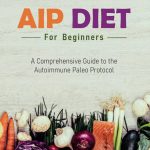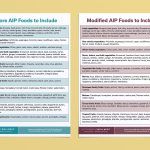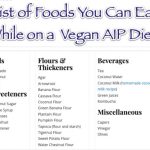Are you tired of feeling like your body is working against you? Do you experience chronic inflammation, fatigue, and brain fog, despite trying various diets and supplements? You’re not alone.
The Autoimmune Paleo Diet: A Game-Changer for Chronic Health Issues
The autoimmune paleo (AIP) diet has been gaining popularity in recent years due to its impressive track record of helping individuals manage and even reverse chronic health issues. By focusing on whole, nutrient-dense foods and eliminating common allergens and irritants, the AIP diet offers a comprehensive approach to healing the gut and reducing inflammation.
What is the Autoimmune Paleo Diet?
The AIP diet is a modified version of the paleo diet that takes into account the unique needs of individuals with autoimmune diseases. The diet eliminates grains, dairy, legumes, nightshades, eggs, nuts, seeds, and processed foods, while emphasizing whole foods like meats, fish, fruits, vegetables, and healthy fats.
In this article, we’ll dive deeper into the AIP diet list of foods, exploring which foods are allowed and which should be avoided. By the end of this post, you’ll have a solid understanding of how to get started with the AIP diet and begin experiencing its benefits for yourself.
To get started with the AIP diet, it’s essential to understand which foods are allowed and which should be avoided. In this section, we’ll explore the AIP diet list of foods, including the top 10 foods you should include in your diet and the top 10 foods you should avoid.
Top 10 Foods You Should Include in Your AIP Diet
The following whole foods are staples of the AIP diet:
- Mushrooms: Rich in antioxidants, mushrooms can help reduce inflammation and improve gut health. Try incorporating varieties like shiitake and oyster mushrooms into your meals.
- Fatty Fish: Fatty fish like salmon, sardines, and mackerel are rich in omega-3 fatty acids, which can help reduce inflammation and promote heart health.
- Bone Broth: Bone broth is a nutrient-rich liquid made by simmering animal bones in water. It’s an excellent source of collagen, protein, and minerals like calcium and phosphorus.
- Leafy Greens: Leafy greens like spinach, kale, and collard greens are rich in antioxidants, vitamins, and minerals. They’re also low in calories and high in fiber.
- Pork: Pork is a lean protein that can be cooked in a variety of ways. Opt for pasture-raised pork to ensure you’re getting the highest quality meat.
- Turkey: Turkey is another lean protein that’s rich in nutrients like vitamin B6, niacin, and selenium. Look for pasture-raised turkey or organic options.
- Grass-Fed Beef: Grass-fed beef is a more sustainable and nutritious option than grain-fed beef. It’s higher in omega-3 fatty acids and conjugated linoleic acid (CLA), which can help reduce inflammation.
- Fresh Berries: Fresh berries like blueberries, raspberries, and strawberries are rich in antioxidants, fiber, and vitamins. They’re an excellent addition to your AIP diet.
- Avocados: Avocados are a nutrient-rich fruit that’s high in healthy fats, fiber, and various minerals. They can be added to salads, smoothies, or used as a topping for meat and vegetables.
Top 10 Foods You Should Avoid on the AIP Diet
The following foods are common allergens and irritants that should be avoided on the AIP diet:
- Nightshades: Nightshades like tomatoes, peppers, and eggplant contain a compound called solanine, which can exacerbate inflammation. Try substituting with other vegetables or using spices to add flavor.
- Legumes: Legumes like beans, lentils, and peanuts are high in lectins, which can cause digestive issues. Instead, opt for pasture-raised eggs or lean meats as protein sources.
- Dairy Products: Dairy products like milk, cheese, and yogurt contain casein, a protein that can stimulate the immune system and worsen inflammation. Try substituting with coconut milk or almond milk instead.
- Eggs: While pasture-raised eggs are allowed on the AIP diet, conventional eggs may contain additives and pesticides that can exacerbate inflammation. Opt for pasture-raised eggs or egg yolks to get the benefits without the potential drawbacks.
- Processed Foods: Processed foods like packaged snacks, frozen meals, and sugary treats contain added sugars, preservatives, and other ingredients that can worsen inflammation. Instead, opt for whole foods and cook your meals from scratch.
- Nuts and Seeds: While nuts and seeds are allowed in small amounts on the AIP diet, many people find that they cause digestive issues or exacerbate symptoms. Try substituting with avocado oil or coconut oil instead.
- Grains: Grains like wheat, oats, and barley contain gluten, a protein that can stimulate the immune system and worsen inflammation. Instead, opt for whole foods like meat, vegetables, and healthy fats.
By avoiding these common allergens and irritants and incorporating the top 10 allowed foods into your diet, you’ll be well on your way to reducing inflammation and improving your overall health. Remember to consult with a healthcare professional before making any significant changes to your diet or supplement routine.
Learn more about the autoimmune paleo diet and how it can help you manage chronic health issues. For personalized guidance, consider consulting with a registered dietitian or healthcare professional who is experienced in working with patients on the AIP diet.
Expert Consultation for Autoimmune Paleo Diet
Get personalized guidance on the Autoimmune Paleo Diet from experienced health experts.
Consult an ExpertAs we wrap up our exploration of the AIP diet list of foods, let’s summarize the key points covered so far:
- The AIP diet is a modified version of the paleo diet that focuses on whole, nutrient-dense foods and eliminates common allergens and irritants.
- The diet eliminates grains, dairy, legumes, nightshades, eggs, nuts, seeds, and processed foods.
- Allowed foods include meats, fish, fruits, vegetables, and healthy fats.
In today’s fast-paced world, it’s easy to get caught up in quick fixes and fad diets. However, the AIP diet offers a comprehensive approach to healing your body and reducing inflammation by focusing on whole, nutrient-dense foods. By making these changes, you’ll not only experience physical benefits but also improve your mental clarity and overall well-being.
So, what are you waiting for? Take control of your health today by starting the AIP diet. With patience, persistence, and a willingness to make lifestyle changes, you can experience the transformative power of this diet for yourself. The journey may not be easy, but the rewards will be well worth it.
Remember, healing is possible, and the AIP diet is a powerful tool in your toolbox. Start your journey today and say goodbye to chronic inflammation, fatigue, and brain fog – hello to renewed energy, mental clarity, and a healthier you!
The Treatment Cost of Hepatitis C: Understanding the cost of hepatitis C treatment is crucial for making informed decisions about your health. Learn about the various treatment options and their associated costs, and take control of your well-being.
Anxiety Causes Heart Palpitations: Understanding the Link: Are you experiencing heart palpitations due to anxiety? It’s not uncommon, but there are ways to manage these symptoms and reduce their impact on your daily life. Click to learn more about the connection between anxiety and heart palpitations.




